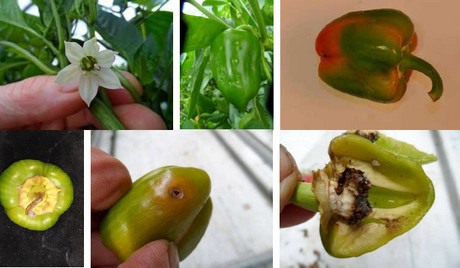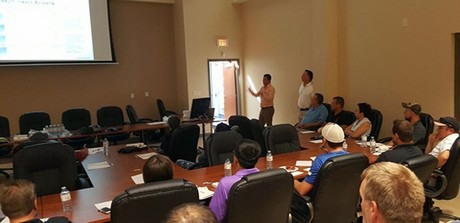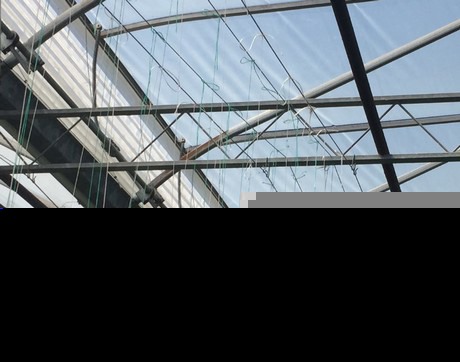The Pepper Weevil (Anthonomus Eugenii) is a bell pepper grower's worst nightmare. The presence of just one adult is a reason to take out an entire crop. Within a short time the weevil is able to develop a large population from fertile egg to adult. Flowering buds or young fruits of bell pepper crops are usually the place where larvae are developing. As a result of this the fruits or buds fail to develop to mature fruits and fruits are aborted by the plant. The pepper weevil also damages older fruits.

The increased presence of the pepper weevil in the Leamington area is a result of the milder winters and more year round greenhouse production. Normally the pest is not able to survive a cold winter, and they can only survive in greenhouses where pepper fruits or solanaceae (nightshade) crops are present. As more growers are doing short crop changes, have interplanting schemes or simply do not take enough time and attention to clean their greenhouses properly, the chances for the pepper weevil to survive increase. This has made Leamington a great hideout for the pest.
Over the last couple of years some Leamington pepper growers have experienced trouble with the weevil at the end of the season. But now that the weevil is also devastating greenhouse pepper crops as early as February, many growers are worried and looking for preventative measures. Sources told HortiDaily that 'right now every grower in the Leamington area is infected by the Pepper Weevil, and that they are even found in open field crops. Around 60-80 hectares is lost.'
Screening solutions
One of the main solutions to keep the pest out is by using insect screening; a common solution that is the standard for vegetable growers situated in warmer climates such as Mexico."While insect screening isn’t usually given much thought by Leamington and Kingsville vegetable growers, this summer has changed that", said Maurico Manotas, President of Svensson's American subsidiary. Last Monday, Svensson hosted an open discussion on the topic of insect exclusion held at the Ontario Greenhouse Vegetable Growers (OGVG) offices.

Svensson's Mauricio Manotas at the insect exclusion screening discussion held last Monday at the OGVG headquarters. (picture by Svensson) Svensson’s
Over 40 growers participated in the seminar and learned more about the primary considerations when it comes to selecting an insect screen. “While many of the insect screen options on the market today may look similar, the screen's hole size, yarn diameter, and the airflow capability are critical considerations", explained Manotas. "Our Econet insect control screens are designed for exceptional performance and effectively increase airflow capacity allowing for greater ventilation with comprising insect control. Available in different hole sizes, the Econet screens provide a secure barrier against even the smallest insects."
According to Manotas many growers and greenhouse builders want to learn more about the options to install screening in existing greenhouses. "They want to learn more about the options and what the possibilities are in terms of installation in existing structures. We consulted them and explained how our screens will stop the bug, while they still maximize airflow. While it can become complicated and quite challenging to install the systems in some structures now that the crops are in, we are cooperating with builders and discussed with them the possibilities down the road."
Also at HollandGaas they notice a growing interest for their insect netting solutions in the Leamington area. Marcel Schulte said that the Dutch manufacturer of the accordion (harmonica) netting cassettes has been very busy over the last couple of weeks to consult many Leamington growers about their solution.
"Our compact folding system is suitable for both existing and new greenhouses and of course polyhouses. Especially with polyhouses with windows that close at the gutter. Whatever the structure may be, we always find a solution to install the folded type, and our local Leamington agent Antonio Gomez is available to help. We see that more growers are willing to invest in these preventative solutions to get rid of the pest without the use of pesticides!"
As an example, Marcel spoke about some larger new operations in Leamington who have chosen to install their insect netting in their new greenhouses. "Those growers are now prepared for this situation, and you see that more growers plan to do the same when building a new greenhouse. Yet, we are also looking at providing a good solution for existing greenhouses. With so many styles of structures in that area, it can become a quite complicated situation to install our cassettes, but we are currently doing our best to visit all of the growers to look at the possibilities for a durable solution."

HollandGaas installation in an existing Leamington greenhouse operation
Furthermore, Schulte also emphasized that before installing any insect screen, a closer look should be taken at the kind of pepper weevil that is present. "The mesh size is the most important aspect of insect netting. Many growers are afraid to lose ventilation and airflow, but the pepper weevil is a relatively large insect, so the losses of ventilation need to be kept at a minimum. With the folded accordion type (harmonica) there is more surface to exchange air. This is also an advantage of a folded type netting system."
